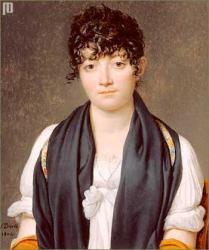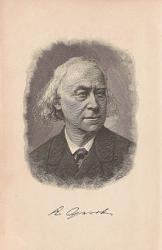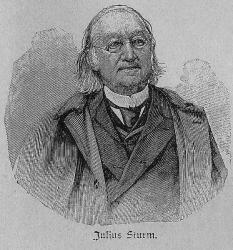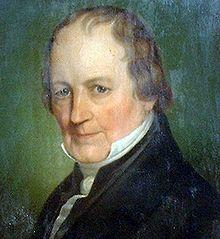Planning worship?
Check out our sister site, ZeteoSearch.org,
for 20+ additional resources related to your search.
- |
User Links
Person Results
‹ Return to hymnal




Export as CSV
Luise Reichardt

1779 - 1826 Person Name: L. Reichhardt Hymnal Number: 98 Composer of "[Wie mit grimm'gem Unverstand]" in Liederlust und Psalter Caroline Luise Reichardt Germany 1779-1826. Born in Berlin to middle class parents and musical composers, she received some formal education and musical training from her father and his friends, but also was self-taught. Her grandfather was Konzertmeister, and her father was Kapellmeister at the court of Frederick, the Great. Louise was musical and had a good voice. She played piano and sang. In 1800 four of her own compositions were published along with a collection of her father’s songs. The Reichardts entertained well-known literary figures of the day. She later used poetry from Phillip Ludwig Achim von Arnim in a collection of 12 songs she composed. In 1809 she settled in Hamburg, Germany, where she made a living as a singing teacher and composed music. She also organized and directed a women’s chorus. She did behind-the-scenes conducting of music when she could. She was known for her untiring efforts in the production of Handel choral works, translating and preparing texts and choruses to be conducted by male counterparts. She also translated the Latin works of Hasse and Graun into German. She played a significant role in the formation of the German choral movement, a driving force in 19th century musical nationalism. She composed 75+ songs and choral pieces in various styles and accompaniments. Her husband-to-be, Friedrich August Eschen, died suddenly on the eve before their wedding. Her second husband-to-be, a painter, Franz Gareis, also died before their wedding. She died at Hamburg, Germany.
John Perry
Luise Reichardt
Friedrich Schneider
1786 - 1853 Person Name: Fr. Schneider Hymnal Number: 186a Composer of "[O, wie so fröhlich, o wie so selig macht uns ein frommes Herz]" in Liederlust und Psalter
Friedrich Schneider
Karl Gerok

1815 - 1890 Person Name: Gerok Hymnal Number: 116 Author of "Ich möchte heim" in Liederlust und Psalter Gerok, Karl von, D.D , was born January 30, 1815, at Stuttgart, and studied theology at the University of Tubingen. He was, from 1836 to 1840, assistant at his father's church in Stuttgart; 1840-43, lecturer (repetent) at Tübingen, and after 1844 diaconus at Böblingen, near Stuttgart. In 1849 he returned to preach at Stuttgart, where he now resides (1886), as chief court preacher and oberconsistorialrath (0. Kraus, 1879, p. 165: manuscript from Dr. von Gerok, &c).
Gerok is well known as an eloquent preacher, and has published various volumes of sermons. His fame principally rests on his sacred poetry. The best known of his poetical works is his Palmblätter, 1857, which has attained a wonderful circulation, and reached a 56th edition in 1886. A new series appeared in 1878 as Palmblätter Neue Folge (9th ed., 1885, under the title Auf einsamen Gängen). A series of poems on the Book of the Acts of the Apostles appeared as Pfingstrosen, 1864, (8th ed. 1886). His other poetical works are, Die letzte Strauss, 1885 (5th ed., 1886), Blumen und Sterne, 1867 (11th ed., 1886), and Deutsche Ostern, 1872(6th ed., 1883). The Palmblätter is in four parts: pt. 1 consisting of poems on Holy Words, i.e. mostly founded on sayings of Holy Scripture; pt. ii. on "Holy Times" (Advent, &c); pt. iii. on "Holy Mountains," and pt. iv. on "Holy Waters," i.e. on Mountains and Waters mentioned in Holy Scripture. From it a few centos have passed into some of the recent German hymn-books; and a version apparently including translations of all the poems in the ed. of the German used appeared in English as Palm leaves by Karl Gerok. Translated from the German by J. E. A. Brown. London: Strahan & Co., 1869. A large number of the individual poems have also been tr, by Miss Borthwick (who has also translated a few from the Pfingstrosen), Miss Burlingham, the Revs. Dr. R. Maguire, E, Massie, J. Kelly, and various others. But as none of these versions have passed into English common use, and as the originals are poems and not hymns, we must refer the reader to the works of these translators.
[Rev. James Mearns, M.A.]
-- John Julian, Dictionary of Hymnology
Karl Gerok
Samuel Hofer
1835 - 1862 Person Name: S. Hofer Hymnal Number: 90 Composer of "[Nun, so bleibt es fest dabei]" in Liederlust und Psalter
Samuel Hofer
Julius Carl Reinhold Sturm

1816 - 1896 Person Name: Julius Sturm Hymnal Number: 53 Author of "Kommt, es ist alles bereit" in Liederlust und Psalter Sturm, Julius Carl Reinhold, was born July 21, 1816, at Köstritz, in the principality of Reuss (younger line). After being a student of theology at Jena, from 1837 to 1841, he was for two years a private tutor at Heilbronn on the Neckar, and then, for a year, at Friesen, in Saxony. In 1845 he became tutor to Prince Heinrich xiv. of Reuss; and after the Prince's confirmation, in 1848, acted as tutor to him for three years more at the Gymnasium in Meiningen. He was then appointed pastor at Göschitz, near Schleiz, in the end of 1850; and pastor at Köstritz, in 1858, where he still (1889) lives as Kirchenrath and Court preacher (Koch, vii. 284; ms. from the author, &c). Sturm is one of the most important of modern German sacred poets. Among his works of this nature may be mentioned:—
(1) Gedichte, Leipzig, 1850; 3rd ed., 1862. (2) Fromme Lieder, Leipzig, 1852; 6th ed., 1867. (3) Zwei Rosen, oder das holte Lied der Liebe, Leipzig, 1854: a version of Canticles. (4) Neue fromme Lieder und Gedichte, Leipzig, 1858; 2nd ed., 1870. (5) Israel's Weg zur Herrlichkeit, Erlangen, 1858; 2nd ed., as Israelitische Lieder, Halle, 1867. (6) Von der Pilgerfahrt, Halle, 1868. (7) Gott grüsse dich. Religiöse Gedichte, Leipzig, 1876. (8) Aufwärtz, Leipzig, 1881. (9) Ich bau auf Gott. Neue religiöse Gedichte, Bremen, 1883. (10) Palme und Krone, Bremen, 1888.
From these works a large number of pieces have passed into recent collections of German sacred poetry, and a few into recent German official hymnbooks. A considerable number have been translation by Lady John Manners, the Rev. J. Kelly, and others, but none have passed into English hymnbooks. [Rev. James Mearns, M.A.]
-- John Julian, Dictionary of Hymnology (1907)
Julius Carl Reinhold Sturm
Johann Peter Schück
1811 - 1892 Person Name: J. Schück Hymnal Number: 23 Composer of "[Jesus ist der gute Hirte]" in Liederlust und Psalter Johann Peter Schück
Johann Peter Schück
Frederic Adolphus Krummacher

1767 - 1845 Person Name: F. A. Krummacher Hymnal Number: 75 Author of "Hoffnung" in Liederlust und Psalter Krummacher, Friedrich Adolf, was a native of Tecklenburg, Westphalia, where his father, Friedrich Jacob Krummacher was Burgomaster and Hoffiscal. He was baptized there, July 22, 1767, and apparently born July 13, 1767. In 1786 he entered the University of Lingen (since 1819 ranked as a Gymnasium), and in 1787 that of Halle. After concluding his theological studies in 1789, he was for some time tutor in the family of Senator Meyer in Bremen; was then appointed, in 1790, Conrector of the Gymnasium at Hamm, and in 1793 Rector of the Gymnasium at Mors (Meurs), near Düsseldorf. In the end of 1800 he became Professor of Theology and Eloquence at the Reformed University of Duisburg. When, after the battle of Jena (Oct. 14, 1806), Duisburg was taken from Prussia, the salaries of the professors ceased, but Krummacher lectured on till his audience consisted of one student. He was then, in the autumn of 1807, appointed pastor of Kettwig, on the Ruhr; in 1812 Chief Court Preacher and General Superintendent at Bernburg; and finally, in 1824, he became chief pastor of the St. Ansgarius Church at Bremen. By reason of growing infirmities he resigned his charge in June, 1843, and died at Bremen, April 4, 1845 (0. Kraus, 1879, p. 310; Blätter für Hymnologie, 1886, p. 80, &c).
Krummacher is best known as a preacher; and as the author of the well-known Parabeln, first published in 1805, which passed through many editions, and ranks as the standard German work of its class. His hymns are little suited for church use, being often allegorical and high-flown, and not for the most part sufficiently simple and direct, though in some cases he does write in a popular, natural style, and with a beauty of his own. His hymns mostly appeared in his Festbüchlein, a work consisting of allegorical narratives, conversations, &c, with interspersed hymns. Of this the 1st part, entitled Der Sonntag, was published 1808 (2nd ed. 1810; 3rd ed. 1813; 4th ed. 1819); pt. ii., entitled Das Christfest, in 1810 (2nd ed. 1814; 3rd ed. 1821); and pt. iii., entitled Das Neujahrsfest, in 1819.
Those of Krummacher's hymns translated into English are:—
i. Allgemach aus Dammerung und Nacht. Advent. In his Festbüchlein, pt. ii., 1810 (1814, p. 154), in 5 stanzas of 4 lines, entitled "The Prophets of Nature"; and given after the conversation on Zacharias, the father of St. John the Baptist. Included as No. 34 in J. P. Lange's Deutsches Kirchenliederbuch, Zurich, 1843. The unity of idea is violated by the concluding lines of st. v.
"Wie die leisen Lispel den Propheten
Einst auf Horeb's Felsenspitz umwehten."
And thus in his preface, p. vii., Dr. Lange sug¬gests that st. v. should read thus:—
"Allgemach und siegreich fort und fort
Bricht durch unser Fleisch das ew'ge Wort;
Die Propheten grüsst es durch Gesichte,
Dann wird's Mensch und himmlische Geschichte."
Translated as:—
Slowly, slowly from the caves of night. A full and good tr. from Lange by Dr. Kennedy, as No. 42 in his Hymnologia Christiana, 1863.
ii. Eine Heerde und ein Hirt. Missions. First published in the 3rd. ed., 1821, of pt. ii. of his Festbüchlein, p. 163, in 6 stanzas of 6 lines, at the close of the section on "Israel and the Strangers." In the Berlin Geistliche Lieder Schatz, ed. 1863, No. 1365, and many other recent collections. The translations are:—
1. One, only One, shall be the fold. By Miss Dunn, in her Hymns from the Germany 1857, p. 49.
2. One Shepherd and one fold to be. In Cantica Sanctorum, 1880, No. 96.
iii. Ja furwahr! uns fiihrt mit sanfter Hand. Ps. xxiii. In his Festbüchlein, pt. i. (3rd ed. 1813, p. 118), in 5 stanzas of 4 lines, with Hallelujahs. It is given in the story of the festal rededication of a village church destroyed in time of war, as a choral hymn sung by boys and girls after the Holy Communion. In the Württemberg Gesang-Buch, 1842, No. 72. Translated as:—
1. Yes! our Shepherd leads with gentle hand, Through. A good and full translation by Miss Borthwick, in Hymns from the Land of Luther, 1st Ser., 1854, p. 59 (1884, p. 60), repeated in Kennedy, 1863; Mrs. Brock's Children's Hymn Book, 1881; the Christian Hymn Book, Cincinnati, 1865, and others.
2. Yea! our Shepherd leads, with gentle hand, Along. In full by M. W. Stryker, as No. 164 in his Christian Chorals, 1885.
iv. Hag auch die Liebe weinen. Love, Faith and Hope. Festbüchlein, pt. i., 1808, p. 136, in 3 st. of 4 1., in the section entitled "The Setting Sun," for Sunday evening. It is appended to a story in which the father has been speaking of the Resurrection of Christ the Sun of Righteousness, as celebrated on that day, the hymn being introduced as sung by the family and neighbours, as he ceased to speak. Included in the Württemberg Gesang-Buch, 1842, No. 628. It is most suited to be sung at a choral funeral. Koch, 2nd ed., iv. p. 695, says it was sung at the author's funeral at Bremen, April 10, 1845, and that st. iii. is on the cross over his grave. He adds that stanzas i., iii. were sung July 17, 1850, at the funeral of Dr. August Neander, the church historian in Berlin; followed by an address by Krummacher’s son, Friedrich Wilhelm (author of the well-known Elijah, Elisha and other works). Tr. as:—
Though Love may weep with breaking heart. A good and full translation by Miss Winkworth in her Lyra Germanica, 2nd Ser., 1858, p. 121. Repeated in Flett's Collection, Paisley, 1871, and in H. L. Hastings's Songs of Pilgrimage, 1887.
Other translations are, (1) "Let love weep,—It cometh," by Miss Warner, 1858, p. 584. (2) "Yea, Love may weep when death prevails," by Dr. G. Walker, 1860, p. 57.
A number of other pieces by Krummacher are translated in the Sacred Lyrics from the German, Philadelphia, 1859; by C. T. Brooks, 1847; by Mrs. Follen, 1851, and by Miss Fry, 1859. As they are poems rather than hymns they are not noted here. [Rev. James Mearns, M.A.]
--John Julian, Dictionary of Hymnology (1907)
Frederic Adolphus Krummacher
Mary F. Kirby
Person Name: M. F. Kirby Hymnal Number: 119 Author of "Das Vaterhaus" in Liederlust und Psalter
Mary F. Kirby
August Heinrich Hoffmann von Fallersleben
1798 - 1874 Person Name: Heinrich Hoffman von Fallersleben Hymnal Number: 177 Author of "Der Weihnachtsmann" in Liederlust und Psalter
August Heinrich Hoffmann von Fallersleben


 My Starred Hymns
My Starred Hymns


